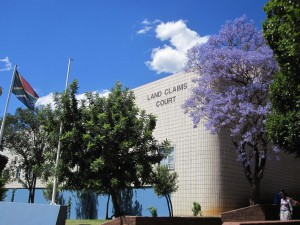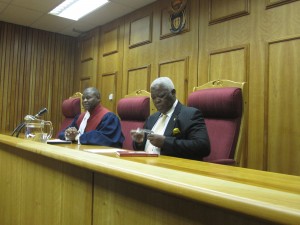 In its spring 2015 volume, The Cambridge Journal of Anthropology published the special issue “Remaking the Public Good: A New Anthropology of Bureaucracy”, edited by Laura Bear and Nayanika Mathur. In this blog post, Olaf Zenker – contributor of the article “De-judicialization, Outsourced Review and All-too-flexible Bureaucracies in South African Land Restitution” – describes how he came across the peculiar case analysed in his article and how this land claim ended up speaking about the “Remaking of the Public Good” in South Africa and beyond.
In its spring 2015 volume, The Cambridge Journal of Anthropology published the special issue “Remaking the Public Good: A New Anthropology of Bureaucracy”, edited by Laura Bear and Nayanika Mathur. In this blog post, Olaf Zenker – contributor of the article “De-judicialization, Outsourced Review and All-too-flexible Bureaucracies in South African Land Restitution” – describes how he came across the peculiar case analysed in his article and how this land claim ended up speaking about the “Remaking of the Public Good” in South Africa and beyond.
How is the new South African state imagined, enacted and contested, when citizens engage officials in the attempts to get back their land lost through racist colonial and apartheid dispossessions? What kinds of “public goods” are brought into play, by whom and with what effects, when the post-apartheid state simultaneously functions as the main driving force behind this land restitution process, as its judicial arbiter through the specialist Land Claims Court, and as its core reference point, as all claims are lodged against the state? Questions like these have driven my intermittent ethnographic fieldwork on South African land restitution since 2010 – not only with regard to claimant communities, but especially also concerning the operations within the two relevant state agencies: the Land Claims Commission and the Land Claims Court.
In recent years, the judicialization of politics has been widely noted and critically discussed within the social sciences as an increasingly global phenomenon. This trend, very present in postcolonial South Africa, strongly shaped my expectations before fieldwork. I imagined, and looked forward to, endless restitution hearings, engagements with overworked state officials, and extensive participant observation in packed courtrooms. Within the Land Claims Commission, this imagination wasn’t too far off the mark; yet my fieldwork encounters in the Land Claims Court proved to be somewhat different.
To begin with, the Land Claims Court can, and frequently does, conduct its hearings at any place in South Africa making itself more easily accessible to claimants; this substantially reduces the number of cases heard at the Court’s official seat in Johannesburg. Of those scheduled for Johannesburg, which I followed during fieldwork, a surprising amount of cases were postponed either on short notice as the parties needed more time or at the beginning of the hearings due to formal mistakes (e.g. file bundles lacking page numbers). Most interestingly, however, several cases scheduled for days or even weeks ended up being settled outside court on day one, typically with the agreement made an order of court. What was truly astounding to me here was the fact that virtually all of these settlements were in favour of the current (usually white) landowners opposing the claim.
How can this be explained? How is one to make sense of the fact that in so many cases, in which “the state” after years of research commits itself to the validity of a particular claim and even lets the conflict surrounding this case escalate to end up in court, both the claimants and the state should deliberately give in right away before even arguing their case during trial? How has this specific constellation been possible legally, politically, morally and socially – let alone likely as a repetitive course of action?
 In the case of the Baphalane Ba Ramokoka community, covered in the article, this puzzle was particularly pronounced. For many years this community had claimed restitution of more than 20 farms in the North West Province of South Africa against the fierce opposition of the current 73 white landowners. However, as the article describes in detail, when the merits of the claim finally were to be dealt with in court, the claimants agreed – seemingly without need – to a highly self-contradictory settlement offering substantially less than they had demanded for such a long time.
In the case of the Baphalane Ba Ramokoka community, covered in the article, this puzzle was particularly pronounced. For many years this community had claimed restitution of more than 20 farms in the North West Province of South Africa against the fierce opposition of the current 73 white landowners. However, as the article describes in detail, when the merits of the claim finally were to be dealt with in court, the claimants agreed – seemingly without need – to a highly self-contradictory settlement offering substantially less than they had demanded for such a long time.
This put me on track to explore the possible reasons behind this surprising twist of events. Evoking the genre of the extended case study, the article situates this moment in court within broader national histories of apartheid injustice and postcolonial redress as well as regarding the complicated readjustments of “bureaucratic authority” within the successor state. These processes have been complicated by local appropriations of globally travelling models of “rule of law” and “juridification”. It is at this juncture that neoliberal regimes of governance, recently propagating the public good in new terms such as “service delivery”, “transparency” and “accountability”, have increasingly transformed South African land restitution in light of an ambiguously de-judicialized bureaucratic flexibility.
The article thus shows how seemingly inconsistent events within state bureaucracies, in danger of ossifying into structural violence, can profitably be made to make sense through an anthropology of bureaucracy that follows the multiple trajectories, in which the public good is remade time and again.
Read Olaf Zenker’s Article in Full Here
Olaf Zenker is Junior Professor at the Institute of Social and Cultural Anthropology, Freie Universitat Berlin.
